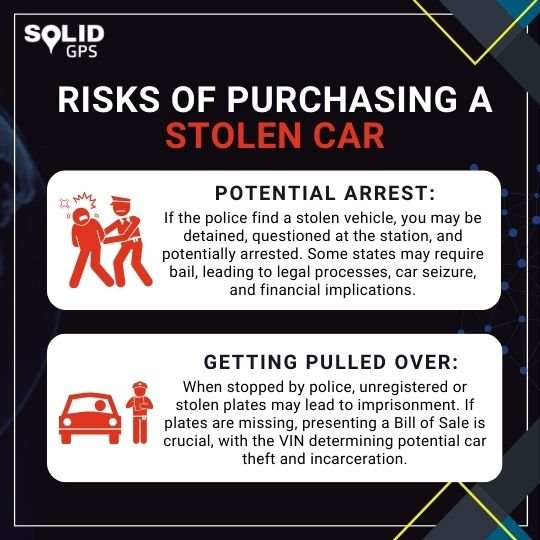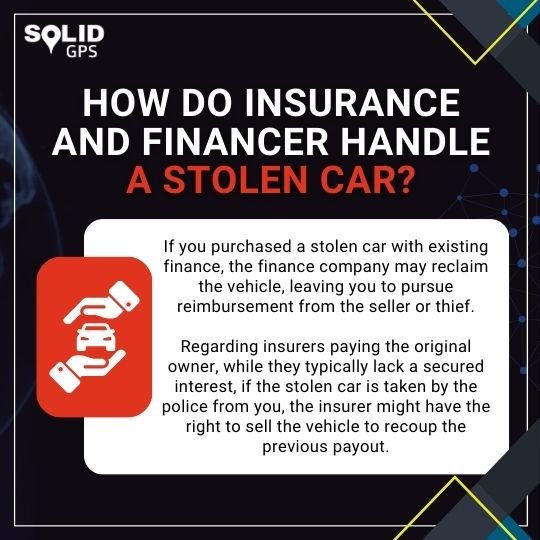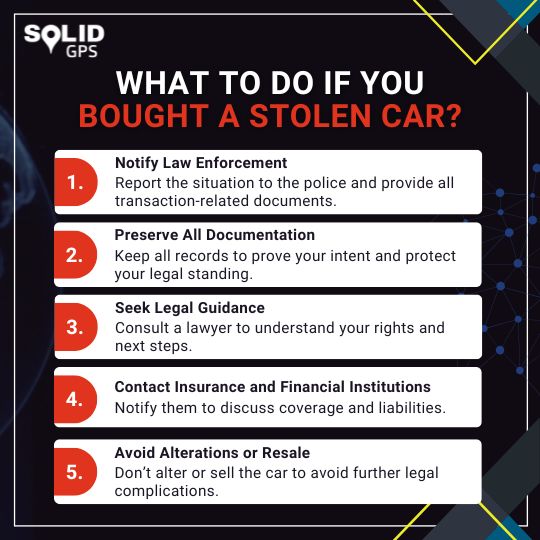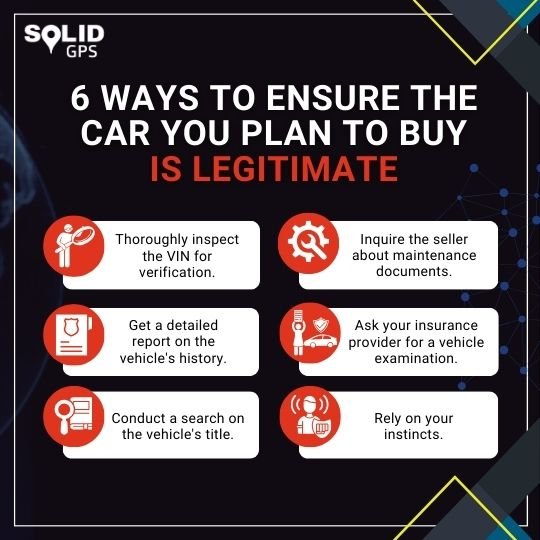What to Do If You Accidentally Purchased a Stolen Car?
Discovering that you’ve unknowingly purchased a stolen vehicle can be a devastating and distressing experience.
While such cases may seem rare, they are often the result of sophisticated scams and deceptive practices by fraudulent sellers.
Taking preventative measures—like securing your vehicle and staying informed about its history—is crucial for reducing risks and ensuring peace of mind.
This guide walks you through essential actions and strategies to help you navigate such a scenario with confidence and clarity.

Confirm Your Vehicle's Status
The first and most critical step upon suspecting that you may have purchased a stolen car is to verify its status using reliable databases.
In Australia, official systems like PPSR (Personal Property Securities Register) and REVS (Register of Encumbered Vehicles) are essential tools for this purpose.
In America, check the car’s VIN using NICB’s VINCheck (National Insurance Crime Bureau) or Carfax. Report it to local law enforcement if flagged as stolen, and visit the DMV (Department of Motor Vehicles) to confirm the title’s legitimacy.
In New Zealand, services like MotorWeb or CarJam are used to check the VIN. If the car is stolen, notify the police and contact Waka Kotahi for registration confirmation.
These systems use the Vehicle Identification Number (VIN) to reveal a car’s history, including any records of theft, accidents, or encumbrances.
Why VIN Checks Are Crucial
The VIN is a unique identifier for every vehicle, and performing a VIN check is the most reliable way to confirm its legitimacy.
Through these databases, you can uncover:
- Whether the car has been reported as stolen.
- Past accident history that may have been hidden by the seller.
- Liens or outstanding debts tied to the vehicle.
Without a proper VIN check, you risk purchasing a vehicle with a hidden and potentially criminal past.
Stolen Cars and DMV Detection
Many stolen vehicles are flagged when buyers attempt to register them.
During the registration process, the VIN and title are checked against national and local databases.
If the VIN is altered, missing, or flagged, officials may seize the vehicle immediately and notify law enforcement.
To avoid this, ensure the title matches the VIN and that the seller provides proper documentation during the purchase.
If you encounter irregularities during registration, cooperate with authorities and provide any supporting documentation you have.

Immediate Consequences of Owning a Stolen Car
If a vehicle you purchased is identified as stolen, several immediate consequences can follow:
- Vehicle Impoundment: The car will be seized and returned to its rightful owner.
- Legal Risks: Even if you purchased the car unknowingly, you may face charges for possession of stolen property, which can lead to fines or even imprisonment.
- Financial Loss: Buyers are typically unable to recover the money spent on a stolen vehicle, as it legally belongs to its original owner.
What to Do Next:
- Notify law enforcement promptly to demonstrate good faith.
- Retain legal counsel to navigate potential charges.
- Preserve all purchase documents as evidence of your intent and transaction history.
Spotting Fake Titles and Documents
One common tactic used by criminals is forging titles, receipts, or identification documents to create the illusion of legitimacy.
As a buyer, it’s critical to scrutinise all paperwork.
Signs of Forgery in Titles:
- Mismatched VINs between the title and the car.
- Obvious alterations, such as inconsistent fonts or erasure marks.
- Missing watermarks or seals typical of official documents.
Always verify the title’s authenticity with your local registration authority before finalising a purchase.
The Importance of a Bill of Sale and Seller's ID
A bill of sale and valid seller identification are crucial to establishing your good faith as a buyer.
These documents provide:
- Evidence of the transaction.
- Details about the seller, which can assist law enforcement if issues arise.
Before purchasing, request the seller’s ID and ensure it matches the name on the vehicle title.
Refuse to proceed with the transaction if the seller is unwilling to provide proper identification or a bill of sale.

Beware of the Rental Car Theft Scheme
Another scheme involves thieves exploiting rental cars. In this tactic, a vehicle is rented, not returned, and then quickly sold before the rental company has a chance to report it as stolen.
Buyers of these cars often find themselves in legal trouble once the theft is officially reported, usually within 30 days.
To avoid falling victim to this scheme:
- Verify the car’s history using the VIN.
- Be wary of vehicles offered at suspiciously low prices or from sellers pushing for quick transactions.
Behavioural Red Flags to Watch For
Criminals selling stolen cars often display certain behaviours to avoid detection.
As a buyer, you should be alert to these warning signs:
- Rushing the Sale: Scammers may pressure you to complete the transaction quickly.
- Evasive Responses: Refusing to answer questions about the car’s history or avoiding providing personal information.
- Reluctance to Show Documentation: Hesitation or excuses when asked for the title, VIN, or seller ID.
If you encounter any of these red flags, walk away from the transaction immediately.
Steps to Take If You’ve Bought a Stolen Car
If you find yourself in the unfortunate position of owning a stolen car, take these steps:
- Notify Law Enforcement: Contact your local police department and report the situation. Provide all documentation related to the transaction, including the bill of sale, communication with the seller, and proof of payment.
- Preserve All Documentation: Retain all transaction records to demonstrate your intent and protect yourself legally.
- Seek Legal Guidance: Consult with a legal expert to understand your rights and navigate the complexities of the situation.
- Contact Insurance and Financial Institutions: Inform your insurer and any financial institution involved in the purchase. They can advise you on coverage options and potential liability.
- Avoid Alterations or Resale: Do not attempt to modify or sell the vehicle, as this could complicate legal proceedings.
Practising Caution in Vehicle Purchases
To avoid purchasing a stolen car, follow these preventative measures:
- Conduct Thorough Research: Use tools like PPSR and REVS to perform a VIN check and examine the vehicle’s history.
- Verify Seller Credibility: Ask for the seller’s ID and confirm their information matches the title and bill of sale.
- Inspect the Title: Look for inconsistencies, alterations, or signs of forgery.
These proactive steps can save you from significant legal and financial complications.

Conclusion
Owning or driving a stolen vehicle—even unknowingly—can lead to severe legal and financial consequences, including impoundment, legal charges, and financial loss.
By conducting thorough checks, verifying seller information, and staying alert to warning signs, you can minimise the risk of purchasing a stolen car.
Taking these precautions not only protects you but also contributes to a more ethical and secure automotive marketplace.
For more information and tips to safeguard your vehicle purchase, explore our FAQs below for detailed guidance and solutions.
Frequently Asked Questions
- Solid GPS Tracker
- SIM Card
- Unlimited SIM Card Data Plan
- Solid GPS Sticker
- Charging Cord
- Instruction Manual
- 31-Day Free Trial
- 12-Month Warranty
All you need to do is download the Solid GPS app from the Google Play Store (Android 4.4+) or the App Store (iOS 13+).
You can also track your vehicle on any device connected to our website, from your tablet to your computer.
Yes, you can cancel your subscription during your 31-day free tracking period, and you won’t be charged anything.
You can easily cancel your subscription in your account settings or by contacting us via email or phone.
We guarantee that Solid GPS works in Australia and New Zealand, and we also support payments in each currency.
Yes, you can. All you need to do is connect your Solid GPS tracker to your vehicle through a standard USB port.
The battery in your tracker is rechargeable, so there’s no need to replace it.
You’ll also receive reminders to your phone and email when your tracker’s battery is low, at 30%.
Since the tracker is recharged infrequently (every 3, 6, or 12 months), it will last longer than most electronic devices, with the battery beginning to deteriorate after 500 recharges.
Your tracker is designed to be tucked away inside your vehicle, hidden, and away from any harsh elements.
However, if you’re concerned that it might come in contact with dust or water, we suggest putting it in a sealed container or a ziploc bag to give it some extra protection.
Yes, and it’s super easy to keep track of all your trackers – you can add as many as you want to your account.
To make sure each one is easy to identify, you can give each of them a unique name and colour.
This can be done quickly by heading over to the account settings section on the Solid GPS app or website.
The tracker does not make any noise and it ONLY emits light while being recharged.
Your Solid GPS tracking device uses the full Telstra & Vodafone network in Australia and Spark & Vodafone network in New Zealand, whichever has the strongest signal at that point in time.
If your tracker enters an area with no mobile coverage, don’t worry! It will save the locations your vehicle travels to and will upload where it went when your vehicle is back in an area with coverage.
The subscription covers the cost of the SIM card inside your tracker and the data it uses.
Instead of negotiating with telcos and finding the best SIM card and plan prices, we organise your SIM card for you, all for a flat competitive rate.
We’re able to achieve such a low-cost subscription because we have tens of thousands of SIM cards in our system, unlocking bulk discounts for you!
The subscription also covers the cost of the Solid GPS app, local customer support, & so much more.
We also don’t plan on and have never increased the price of our subscription.
As your vehicle moves, your tracker will update its location every 2 minutes and gradually increase the time between updates to every 10 minutes.
You can also turn on ‘Emergency Mode’ to lock the tracking intervals to every 2 minutes.
Additionally, you can set geofences/boundaries to receive alerts if your vehicle begins to move.
To see what the dashboard/app looks like, please create an account at solidgps.com/registration/, and you’ll be taken to our demo dashboard.
Yes, multiple people can download the same app and log in to the same account to view the same tracker.
You can also securely share your tracker with friends or family through our sharing feature.
For example, if you’re going on a trip, share your private tracking link with others, and they can see where you are without being able to change any settings. You can cancel this link at any time too.
Order Australia's Best Portable GPS Tracker Below
Place Your Order
Standard Tracker
- Average 3-Month Battery Life
- USB Rechargeable
- 85mm*50mm*22mm
- 31-Days Free Tracking
- 4G SIM + Unlimited Data*
- Free Standard Shipping
Large Tracker
Most Popular
- Average 6-Month Battery Life
- USB Rechargeable
- 85mm*50mm*22mm
- 31-Days Free Tracking!
- 4G SIM + Unlimited Data*
- Free Standard Shipping
MEGA Tracker
Best Value
- Average 12-Month Battery Life
- USB Rechargeable
- 85mm*55mm*35mm
- 31-Days Free Tracking
- 4G SIM + Unlimited Data*
- Free Standard Shipping
31-day Free Tracking Before Subscription Begins.

Solid GPS is based in Melbourne, Victoria. All design, development and assembly is done in-house.
© Copyright 2025 Solid GPS
Privacy Policy | Terms & Conditions






